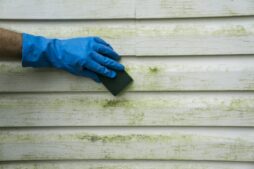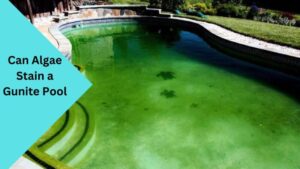Have you noticed unsightly green stains in your gunite pool? If so, you may be wondering: can algae stain a gunite pool? In this comprehensive guide, we will explore the causes of algae staining in gunite pools, how to remove these stubborn stains, and effective methods for preventing them from reoccurring. Whether you prefer DIY approaches or professional assistance, we have you covered. Let’s dive in and tackle this algae-staining mystery head-on!
- Understanding Algae Stains in Gunite Pools
- What Causes Staining in a Gunite Pool?
- Can Algae Permanently Stain a Pool?
- Removing Algae Stains from Gunite Pools
- How to Remove Algae Stains from Gunite Pool
- Preventing Algae Stains in Gunite Pools
- Tips for Preventing Algae Growth and Staining
- Dealing with Other Types of Pool Stains
- Gunite Pool Stains: Identifying Common Types
- How to Remove Pool Stains Without Draining
- The Benefits of Hiring a Professional Pool Cleaner
- Conclusion
Understanding Algae Stains in Gunite Pools
Gunite pools are a popular choice due to their durability and versatility. However, even these well-constructed pools are not immune to the threat of algae stains. Understanding the factors that cause staining in gunite pools and whether algae can permanently stain a pool is crucial in effectively combating the issue. To learn more about the A Complete Guide to Eradicate Mustard Algae: Say Goodbye to Pool Troubles read our detailed guide.
What Causes Staining in a Gunite Pool?
Various factors contribute to staining in gunite pools. These stains can range from green algae stains to more stubborn discolorations caused by metals or organic matter. The presence of algae in the pool can lead to persistent staining if not addressed promptly. Algae can latch onto the porous gunite surface, gradually forming greenish patches that mar the pool’s appearance.
Can Algae Permanently Stain a Pool?
The good news is that algae stains can generally be removed if the right approach is taken. With proper techniques, tools, and regular maintenance, you can successfully eliminate these unsightly stains and restore your pool’s pristine condition. However, neglecting algae stains may result in more stubborn or even permanent discolorations, making it crucial to act promptly.
Here is our latest article and must read guide about How to Get Rid of Algae Dust in a Pool
Removing Algae Stains from Gunite Pools
Now that we understand the causes of staining and the potential risks of neglecting algae stains, let’s explore how to remove them effectively. By following these step-by-step instructions, you can say goodbye to green stains and restore the beauty of your gunite pool.
How to Remove Algae Stains from Gunite Pool
- Gather the necessary supplies:
- Pool brush
- Pool vacuum
- Algae cleaning solution
- Protective gloves and goggles
- Brush the affected areas: Start by vigorously brushing the algae stains using a pool brush. This helps to break down the algae and loosen its grip on the gunite surface.
- Vacuum the pool: Use a pool vacuum to remove any dislodged algae particles. This ensures that loose algae doesn’t settle back onto the pool surface.
- Apply algae cleaning solution: Follow the manufacturer’s instructions to apply an algae cleaning solution specifically designed for gunite pools. Be sure to wear protective gloves and goggles when handling these chemicals.
- Scrub and brush: Allow the algae cleaning solution to sit on the stains for the recommended time. Then, scrub the stains using the pool brush, focusing on the affected areas. This further loosens the algae and facilitates its removal.
- Vacuum again: Once the algae stains have been scrubbed, vacuum the pool once more to eliminate any remaining debris or algae particles.
- Monitor and repeat if necessary: Check the affected areas for any lingering stains. If needed, repeat the above steps until the pool is free from algae stains.
By diligently following these steps, you can successfully remove algae stains from your gunite pool and restore its original beauty. Remember to always prioritize safety when handling pool chemicals and equipment.
Preventing Algae Stains in Gunite Pools
Prevention is key when it comes to algae stains in gunite pools. By implementing proper maintenance routines and utilizing effective preventative measures, you can minimize the risk of algae growth and staining. Here are some tips to keep your pool pristine and free from algae stains.
Tips for Preventing Algae Growth and Staining

- Maintain proper water chemistry: Regularly test your pool water and maintain the appropriate pH balance and sanitizer levels. Algae growth is more likely to occur in pools with imbalanced water chemistry.
- Brush and vacuum regularly: Brush the pool walls, floors, and other surfaces regularly to prevent algae from adhering to the gunite. Use a pool vacuum to remove any loose debris or algae particles.
- Keep filtration system clean: Clean and maintain your pool’s filtration system according to the manufacturer’s instructions. A well-functioning filtration system helps remove impurities and prevents the buildup of algae.
- Circulate the water effectively: Optimize your pool’s circulation system to ensure proper water flow. Stagnant water provides an ideal environment for algae growth, so ensure proper circulation to keep the water fresh and algae-free.
- Use algaecides and clarifiers: Incorporate algaecides and clarifiers as part of your regular pool maintenance routine. These products help prevent algae growth and improve water clarity.
By following these preventative measures, you can significantly reduce the risk of algae staining and keep your gunite pool looking crystal clear all year round.
Dealing with Other Types of Pool Stains
In addition to algae stains, gunite pools can also experience staining from other sources. It’s important to understand the common types of stains that may occur and how to effectively remove them without resorting to draining the entire pool.
Gunite Pool Stains: Identifying Common Types
- Organic stains: These stains are typically caused by leaves, grass, or other organic matter. They often appear in shades of brown or green.
- Metallic stains: Due to the presence of metals like copper or iron in the pool water, metallic stains can occur. These stains can range from blue-green to brown.
- Mineral/scale stains: Hard water or high mineral content can cause mineral or scale stains, appearing as white or grayish deposits on the pool surface.
How to Remove Pool Stains Without Draining
Removing stains from a gunite pool without draining the entire pool is possible with the right techniques. Here’s a step-by-step process to tackle different types of stains effectively:
- Identify the stain type: Determine the type of stain by observing its color, location, and possible causes. This helps select the appropriate stain removal method.
- Test the stain remover: Before applying any stain remover to the pool, test it on a small inconspicuous area to ensure compatibility and prevent any potential damage to the pool surface.
- Choose the right stain removal method: Based on the type of stain, select the appropriate stain removal method. Each stain type may require a different approach or specific chemical treatments.
- Follow the manufacturer’s instructions: Whether using a commercial stain remover or a DIY solution, always follow the manufacturer’s instructions carefully. Incorrect application can lead to ineffective results or damage to the pool surface.
- Scrub gently: Once the stain remover has been applied, use a soft brush or sponge to gently scrub the affected areas. Avoid using abrasive materials that may scratch or damage the gunite surface.
- Rinse and monitor: After scrubbing, rinse the treated areas thoroughly with clean water. Monitor the stains, and repeat the process if necessary until the stains are successfully removed.
By utilizing these stain removal techniques and avoiding the need for draining the pool, you can effectively tackle various types of stains in your gunite pool.
DIY Solutions for Algae Stain Removal
If you prefer a more natural approach or want to try DIY solutions to remove algae stains from your pool, several household ingredients can help. However, it’s important to understand the pros and cons of using these remedies.
Natural Remedies for Algae Stain Removal
- Vinegar: Diluted white vinegar can be effective in loosening and removing algae stains. Apply it directly to the stained areas and scrub gently with a brush.
- Baking soda: Mix baking soda with water until it forms a paste. Apply the paste to the stains and let it sit for a while before scrubbing.
- Lemon juice: The citric acid in lemon juice can help break down algae stains. Apply some lemon juice directly to the stains and scrub gently.
Pros and Cons of DIY Solutions
While DIY solutions can be a cost-effective and readily available option, they may not always yield the same results as commercial stain removers. DIY solutions typically require more frequent application, and the effectiveness may vary depending on the severity of the stains. Additionally, certain remedies may not be suitable for all types of pool surfaces or may require extra caution when handling.
If you opt for DIY solutions, closely monitor the results and be prepared to switch to commercial stain removers if needed.
Calling in the Professionals
In some cases, the stubbornness of stains or the complexity of the pool’s condition may require professional assistance. Hiring a professional pool cleaner can provide multiple benefits and ensure effective stain removal without compromising the integrity of your gunite pool.
The Benefits of Hiring a Professional Pool Cleaner
- Expertise and experience: Professional pool cleaners have the knowledge, skills, and experience to tackle even the most challenging stains. They can identify the stain type accurately and choose the most appropriate treatment methods.
- Specialized equipment and techniques: Professionals are equipped with specialized tools, equipment, and stain removal techniques that may not be readily available to homeowners. These advanced methods can yield faster and more effective results.
- Time-saving and convenience: By hiring professionals, you can save valuable time and effort. They handle the entire stain removal process, allowing you to relax and enjoy your pool without the stress of DIY stain removal.
Conclusion
Algae stains in gunite pools can be a frustrating issue, but they are not unbeatable. By understanding the causes of staining, implementing preventative measures, and taking prompt action to remove stains when they occur, you can maintain a beautiful, algae-free pool. Whether you choose the DIY route or prefer to call in the experts, the key is to stay proactive in your pool maintenance routine. Say goodbye to algae stains and hello to the refreshing, crystal-clear waters of your gunite pool!

Greetings, fellow pool enthusiasts! I’m Turner Davis, your dedicated guide to the world of pool care and maintenance. With over a decade of experience in the field, I’ve made it my mission to transform ordinary pools into extraordinary aquatic retreats.

